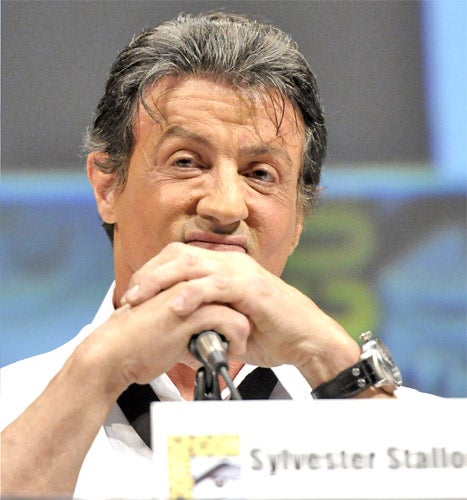Stallone joins US invasion of French ghettoes

Your support helps us to tell the story
From reproductive rights to climate change to Big Tech, The Independent is on the ground when the story is developing. Whether it's investigating the financials of Elon Musk's pro-Trump PAC or producing our latest documentary, 'The A Word', which shines a light on the American women fighting for reproductive rights, we know how important it is to parse out the facts from the messaging.
At such a critical moment in US history, we need reporters on the ground. Your donation allows us to keep sending journalists to speak to both sides of the story.
The Independent is trusted by Americans across the entire political spectrum. And unlike many other quality news outlets, we choose not to lock Americans out of our reporting and analysis with paywalls. We believe quality journalism should be available to everyone, paid for by those who can afford it.
Your support makes all the difference.The actor Sylvester Stallone will venture tomorrow to a place where even his tough-guy alter-egos Rambo and Rocky might fear to tread: the suburbs of greater Paris.
The visit to Rosny-sous-Bois, a multi-racial town close to the epicentre of the 2005 French riots, is a stop on Stallone's promotional tour for his new film "Expendables".
It forms part of a pattern of American political and cultural "outreach" to the troubled – and dynamic – "banlieues" (suburbs) of French cities which, according to local people, puts French government efforts to shame.
Mr Stallone will arrive by helicopter to a red carpet reception at the Rosny branch of French cinema chain UGC, possibly accompanied by two other "tough guy" stars of the film, Dolph Lundgren and Mickey Rourke. A large crowd is expected to welcome Mr Stallone to Rosny-sous-Bois, a typical slice of the jumbled, multi-racial, northern suburbs of Paris which ranges from prim bungalows to grim council estates. A brief visit by John Travolta to a similar district last year attracted a noisy and racially-varied crowd of mostly young people.
Mr Travolta was advertising his thriller "Paris with Love". Film industry executives are said to have been impressed by the reception that he received in the "banlieues", compared to the limply polite reaction that Hollywood stars receive when they make visits to Paris proper.
The Stallone and Travolta visits are part of a, perhaps surprising, surge of American political and cultural interest in the French urban ghettoes since the riots of October and November 2005. In April, Barack Obama's ambassador to France, Charles Rivkin, a former Hollwood producer, brought Samuel L. Jackson, star of "Pulp Fiction" and "Shaft", to Bondy, just north east of Paris proper, to talk to young people about how he escaped poverty and racial prejudice in Tennessee. Ambassador Rivkin, one of Mr Obama's earliest backers and his chief fundraiser in Hollywood, used to run The Jim Henson Company, the maker of The Muppet Show and Sesame Street. "I had been in La Corneuve (just north of Paris) asking students what they like about America," Mr Rivkin said. "They replied, 'We love Samuel L Jackson, we love Will Smith, Jay-Z', all these guys – and I had said, 'Well, who knows? Maybe one day I'll bring one of them back to see you.'"
But what was the US ambassador to Paris doing in a place like La Courneuve in the first place? The town is where Nicolas Sarkozy promised to use a Karcher – or high-powered hose – to clear out the drug gangs in 2005. Ambassador Rivkin has taken advantage of the popularity of Mr Obama in the banlieues to make personal visits which would have been ill-advised in the Bush era.
But even under the Bush presidency, the US embassy in Paris had started to reach out to the multi-racial French suburbs. This was partly prompted by fears that the fanatical anti-Americanism which produced the 9/11 attacks in 2001 was being fostered by extreme Islamist groups in Paris and Lyons. But it was also prompted by a belief that the next generation of movers and shakers in France might come from surprising places. "The Americans are betting on socio-demographic change in France," said Vincent Geisser, a French sociologist. "They reckon that the French elites – now white and ageing – will have to change and the leaders of tomorrow may come from the periphery of the system."
The US embassy has, since 2001, built an extraordinary network of contacts among the young, non-violent political and cultural leaders in the Paris suburbs, many of whom contrast the US interest in them with the relative inaction – despite many promises – of successive French governments since the 2005 riots.
Rokhaya Diallo, 32, of a group called "Les Indivisibles", which promotes racial harmony, said: "A foreign country identifies us as potential leaders. Here we receive no recognition."
Join our commenting forum
Join thought-provoking conversations, follow other Independent readers and see their replies
Comments